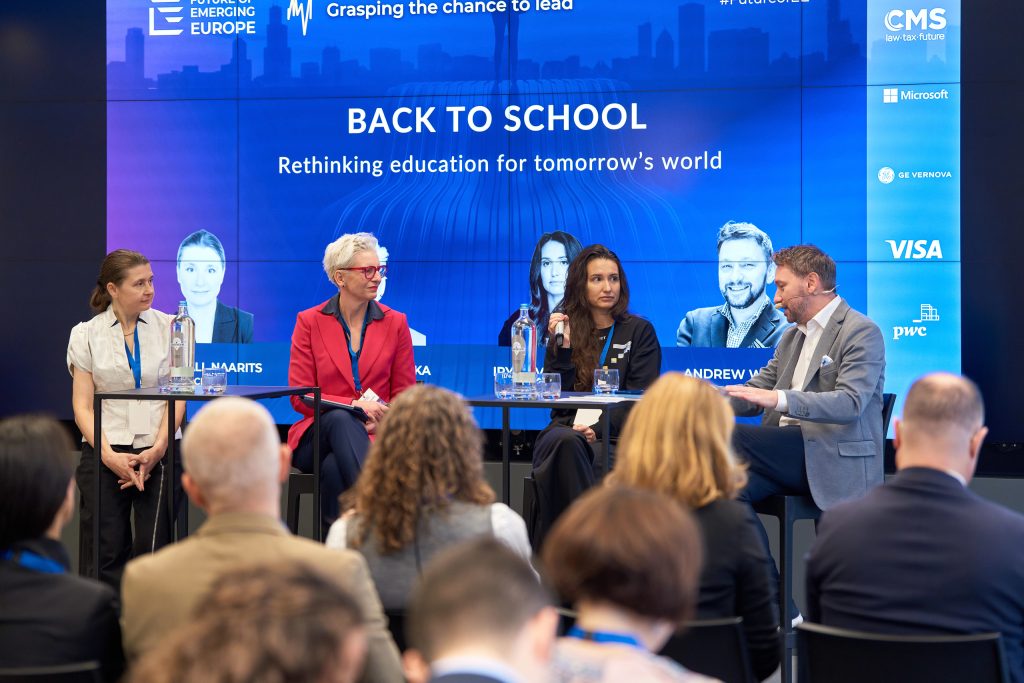There is more to creating a future-proof education system than teaching kids how to code. We need to focus on lifelong learning, upskilling, and mental well-being.
In an ever-changing world, rethinking education for tomorrow’s needs has never been more important. The traditional methods that have served us well for centuries are now being challenged by the rapid pace of technological advancements and the changing dynamics of the global economy.
In the emerging Europe region, two key themes come to the forefront: closing the skills gap and preventing brain drain. Both pose significant threats to the economic growth and development of the region.
But how to tackle these pressing issues? At the Future of Emerging Europe Summit and Awards, held in Brussels on November 8, Emerging Europe brought together several experts to explore what more can be done to ensure that education across the region is future-proof and aligned with market needs. In an age where technology is disrupting traditional industries and creating new ones at an unprecedented rate, it is crucial that our education system keeps pace with these changes.
Coding is not a panacea
Iryna Volnytska is president of SET University, a Ukrainian next-generation tech university that provides educational opportunities for Ukrainian students all over the world.
According to Volnytska, Ukraine faces a surplus of tech graduates unable to find jobs due to lack of business skills—and Ukraine is certainly not the only country in the region facing such a problem. Coding, for so long viewed by many educational experts as the answer to future-proofing learning, can no longer be viewed as a panacea.
“Coding isn’t the solution now and wasn’t the solution in the past,” she said at the Brussels event. “IT firms have their own academies to teach coding. What we teach [at SET] is how to transform technology into a business. We need to nurture emotional intelligence, human skills that can’t be replicated by artificial intelligence (AI).”
For Tina Sobocińska, founder of HR4Future, a Polish firm helping companies digitalise their human resource processes, believes that technological skills, such as coding and digital literacy, remain important in today’s fast-paced world, but that as technology changes, “we need to be ready to adapt, and that requires different skills, soft skills”.
“We need to rethink the way we work, learn, teach, and educational institutions need to lead. Learning should be lifelong—we should always be ready to reskill and upskill,” she added.
Anu-Mall Naarits is CEO at Visionest Institute, which helps companies develop employee skills and has recently been working with Ukrainian firms to boost their export potential. She agrees in the importance of lifelong learning.
“In the past, the skills we learnt at school and university would last us until retirement,” she said. “We still have much the same model, but the world is changing. So it means that we need to learn quicker, and one of the skills we need to acquire is how to learn quicker.”

From left to right: Anu-Mall Naarits, Tina Sobocińska, Iryna Volnytska, and Emerging Europe’s Andrew Wrobel
Lifelong learning and mental health
To begin this process, there needs to be a partnership between educational institutions and different organisations from both the private and public sectors. “It’s critical,” said Sobocińska, “especially if we are to utilise AI effectively in curriculum development.”
She also suggests that problem-solving skills can be taught across all levels of education, from preschool to adulthood, to address real-world issues.
Iryna Volnytska agrees in the need for lifelong learning, citing research which shows that today’s young people will change career many times throughout their lives. “We recently introduced our first master’s degree, and the average age of the students is 35,” she said. “I think this demonstrates that we do have time to go back to school.”
This is a slightly different approach to that advocated by Anu-Mall Naarits, who says that learning can be blended into daily life and work, rather than adhering to traditional education systems. She also argues that as well as understanding what we need to learn, “we also need to understand what we should unlearn.”
And nor should mental health and well-being be underestimated. “It needs to be taught at the early stages,” said Naarits.
The World Economic Forum has made an assessment that upskilling has the potential to add six trillion US dollars to global GDP by 2030, and five million jobs.
If the discussion at the Future of Emerging Europe Summit and Awards is any guide, the key to making the most of this potential lies in fostering a culture of lifelong learning, nurturing both technical and soft skills, and promoting cooperation between educational institutions and the private and public sectors.
As we move forward, it is crucial to remember that while technology plays a vital role in our lives, human skills that cannot be replicated by artificial intelligence are equally important.
Moreover, we must not overlook the importance of mental health and well-being in our pursuit of knowledge and skills. As Anu-Mall Naarits rightly pointed out, understanding what we need to unlearn is just as important as knowing what we need to learn.
As we navigate this rapidly changing landscape, Iryna Volnytska’s reminder that we do have time to go back to school is pertinent. Indeed, in this era of constant change and evolution, going back to school may be the most forward-thinking move we can make.
Lifelong learning and upskilling are no longer just educational imperatives—they are economic ones. Time for the region to embrace this opportunity to shape a future-ready education system that serves not only emerging Europe but the world at large.
Unlike many news and information platforms, Emerging Europe is free to read, and always will be. There is no paywall here. We are independent, not affiliated with nor representing any political party or business organisation. We want the very best for emerging Europe, nothing more, nothing less. Your support will help us continue to spread the word about this amazing region.
You can contribute here. Thank you.


